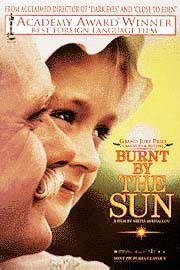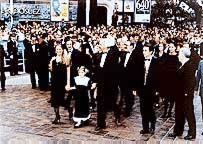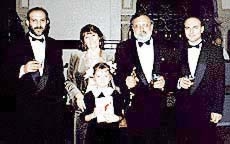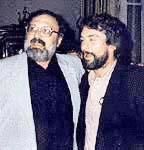
Summer 1995 (3.2)
The Scorching
Sun
and the Nature of Totalitarian Systems
Film
Wins 1995 Oscar for Best Foreign Film
Interview with Screenwriter,
Rustam Ibrahimbeyov
by Betty Blair
See Also:
Famous
People: Then and Now - Rustam Ibrahimbeyov
Cinema
and Censorship - A
Glimpse of the Former Soviet Union

 Editor's Note: This
year's Oscar for "Best Foreign Language Film" went
to "Burnt by the Sun" produced in Russia and directed
by the well-known Russian director, Nikita Mikhalkov. However,
one of Azerbaijan's foremost cinematographers, Rustam Ibrahimbeyov,
(pronounced roo-STAM ee-bra-him-BEY-ov) was profoundly involved
with the creation of the film from its inception. The following
interview took place April 2nd in Santa Monica, California, between
Azerbaijan International's editor, Betty Blair, and novelist,
playwright, screenwriter Mr. Ibrahimbeyov.
Editor's Note: This
year's Oscar for "Best Foreign Language Film" went
to "Burnt by the Sun" produced in Russia and directed
by the well-known Russian director, Nikita Mikhalkov. However,
one of Azerbaijan's foremost cinematographers, Rustam Ibrahimbeyov,
(pronounced roo-STAM ee-bra-him-BEY-ov) was profoundly involved
with the creation of the film from its inception. The following
interview took place April 2nd in Santa Monica, California, between
Azerbaijan International's editor, Betty Blair, and novelist,
playwright, screenwriter Mr. Ibrahimbeyov.
It must be thrilling to be
acknowledged internationally with one of the highest accolades
in the film industry. What does winning this Oscar mean to you?
When film director, Nikita Mikhalkov,
went on stage to accept the trophy, if you recall, he took his
eight-year-old daughter, Nadia, who had starred with him in the
film. They asked what the Oscar meant to her and she replied,
"Well, I hope, at last, that they'll buy me a bike!"
I don't know exactly what my "bike" will be, but this
honor is extremely important. We've always grown up with the
idea that the Oscar is something extraordinarily unique-something
very honorable. As a professional cinematographer, I feel a deep
respect for this prize. Somehow, it seems that among Europeans
there's always a feeling that the Oscar is much more difficult
to win than, say, the Cannes Festival. Perhaps, it's because
Hollywood is geographically further away that this perception
exists. However, "Burnt by the Sun" took both awards
this year-the "Grand Prix" at 47th International Cannes
Film Festival (May 22, 1994) and "Best Foreign Language
Film" at the Oscars (March 27, 1995). That's an extremely
rare combination. European cinema and American cinema are based
on very different criteria. What is liked and understood in Europe
may not be duly appreciated in the U.S. and vice versa. We're
immensely pleased that the film won both prizes plus the "Prix
du Jury Oecumenique" issued by the Prince of Monaco (May
19, 1994).

 Photo: At the Cannes Festival (1994) after winning the "Grand
Prix" for "Burnt by the Sun." Left to right: Mikhalkov's
wife; Mikhalkov's daughter, Nadia, who starred in film; Nikita
Mikhalkov, director and main actor; Rustam Ibrahimbeyov, screenwriter;
and Meshikov (actor).
Photo: At the Cannes Festival (1994) after winning the "Grand
Prix" for "Burnt by the Sun." Left to right: Mikhalkov's
wife; Mikhalkov's daughter, Nadia, who starred in film; Nikita
Mikhalkov, director and main actor; Rustam Ibrahimbeyov, screenwriter;
and Meshikov (actor).
Did you expect to win?
Up even until the very last
minute, I never expected it. Not at all. We didn't even bother
to take our cameras along. So when we did win, we weren't able
to take any personal photos. Last year we had also been nominated
for an Oscar for "Close to Eden" which everybody had
liked. Despite its popularity, it didn't win. So we didn't have
high hopes this year because not many people had seen our film.
Besides, there are always so many political reasons and nuances
why any film wins an Oscar. Sometimes, it's merely respect for
a specific actor, actress or director.

 Photo: Oscar Night. Rustam Ibrahimbeyov and his wife with
Mikhalkov's daughter, Nadia, and other actors in Prize-winning
Best Foreign Film, "Burnt by the Sun" in Los Angeles,
1995.
Photo: Oscar Night. Rustam Ibrahimbeyov and his wife with
Mikhalkov's daughter, Nadia, and other actors in Prize-winning
Best Foreign Film, "Burnt by the Sun" in Los Angeles,
1995.
And this year, there were very
good films in the foreign category, especially Macedonia's "Before
the Rain," and Taiwan's "Eat Drink Man Woman".
So we were very surprised to win. Actually, this is the third
time that one of Mikhalkov's films has been nominated for an
Oscar. That's a rarity for a foreign director, though not so
unusual for Americans.
What exactly was your role
in the creation of this film?
I was involved from the inception
of the idea, from the very first word right up to the very last
moment. I was basically involved with writing and cinematography.
Everything-all the dialog and all the scripted action-emerged
from working together with Nikita. But the credit for transforming
the written word from paper to action on the screen must be credited
to the artistic ability of the director, Nikita Mikhalkov.
What were you trying to say
in "Burnt with the Sun"?
The story line focuses on Stalinism
and its devastating impact on the life of an individual Bolshevik
colonel. It's about Stalinist purges. The main image-the "Sun"-is
Stalin. Totalitarian systems are "governable" or manageable
only up to a certain point. Afterwards, they take on a life of
their own, destroying not only those whom they were originally
intended to destroy but their creators as well. Specifically,
we had in mind the immense system of the Soviet Union. But you'll
see that we're not blaming anybody. We're merely trying to show
that everyone became a victim.

 Were
you only addressing communism or did you have other systems in
mind?
Were
you only addressing communism or did you have other systems in
mind?
Specifically, we addressed the
communist system. The scenes are concretely based on life in
the former Soviet Union. But the nature of all totalitarian systems
is the same. Any system created by force, artificially, will
take on such characteristics.
Could you have made this
film ten years ago during the Soviet period?
Photo: Azerbaijani screenwriter, Rustam Ibrahimbeyov
with American actor, Robert deNiro.
Strange as it may sound, yes.
It would have been possible. During a press conference at Cannes,
I mentioned that I was proud that this film could have been produced
ten years earlier. Of course, it wouldn't have been possible
during Stalin's era. But after his death, yes. I'm happy to say
that we haven't abused our newly acquired freedom.
What do you mean by that?
These days, there is a rush
to destroy everything that relates to the past. But we must be
careful not to discard and purge everything. So many people are
cursing all the old idols-the exact idols that they used to worship.
I've never been a communist. So I'm quite removed from all this.
But I never try to blame or insult anyone who was, or may still
be, a communist.
These days so many people are acting like slaves. During the
Soviet period, they were afraid to say anything and now with
independence, they explode with accusations and curses. However
bad or evil the system might have been, there were some absolutely
remarkable things about our lives during that period. We shouldn't
eliminate everything from our past, or as you say, "Throw
the baby out with the bath water!" We can't dump everything
before acquiring new values to fill the void. To disregard and
discount everything from the Soviet period would be Bolshevistic.
Today, there are some "so-called" democrats who are
trying to do just that. In my opinion, we have to deal objectively
with the previous system. Though it may have been monstrous,
it contributed many positive dimensions to our lives.
We don't say it directly in the film, but it's there. We've tried
to create an aura of sympathy for our characters. Today, you
can find many pieces of art or literature where communists are
depicted as villains or fools. That was the same approach used
to describe capitalists and landowners during socialism. Our
film doesn't do that. We shouldn't forget everything and plunge
blindly into the future. Reactionism and forgetfulness are the
most disastrous flaws in human nature. Human behavior is much
more complex.
What is the creative process
like for you?
When it comes to films that
Nikita and I have worked on together, the ideas and concepts
emerge from the problems that we see occurring around us. We
spend a lot of time together, discussing all these issues. We've
worked together, on and off, since 1971. Eventually, we settle
on a problem and develop it together.
Problems are eternal. It simply depends on what period you happen
to live in. Some problems emerge to the forefront while others
get shoved aside temporarily. But the major eternal issue, in
my opinion, is the problem of how to remain a human being in
the face of all the temptations which provoke evil within us.
Human beings have survived thousands of years. However, they
have survived primarily due to tricks, craftiness, deceitfulness
and meanness-that's the way it seems we always try to subdue
life's dragons, dinosaurs and monsters.
So then, what do feel are
the most pressing problems these days?
Currently, we're living in a
quiet period-more or less. It's time we got rid of these negative
features and became human beings in the real sense of the word.
Throughout the whole evolutionary period, mankind has been striving
to find out how to become really human. This is where literature
plays an immensely important role. Everyday of our lives is a
struggle-a fight with our own nature. Everyday we have to suppress
the evil within us. And yet, it seems, centuries will be required
before mankind can achieve this ideal.
What problems concern you
most about Azerbaijan?
I'm very much concerned about
what is happening in Azerbaijan. The ultimate question is whether
Azerbaijan can continue to exist as an independent state. There
are tremendous influences at work, pulling from opposite ideologies
and geo-political tensions. I'm absolutely convinced that there
are outside forces that wish Azerbaijan's annihilation as an
independent state. Fortunately, the standards of the international
community are placing restraints on these tendencies; otherwise,
we would have already been wiped out.
Armenians have always considered Karabakh their land. That's
their point of view. We also consider it our land and are just
as sincere about our point of view. I'm not blaming the Armenians
for their point of view, but I do condemn their methods of trying
to achieve their goals. Fighting is no way to achieve your aims
in the 20th century. We have to sit down and discuss the problems
and come to some solution. Any attempt to aggressively acquire
land is a crime against both communities.
Remember, it was a single shot in Sarajevo that led to World
War I. We still don't know what the consequences or resolution
of the Karabakh conflict will be. I know that Armenians themselves
have supplies and resources sufficient only to last for a single
month. I can't say now who is concretely helping Armenia but
I know that Armenians are much better known in the world than
we are. Therefore, they get more assistance. Their influence
is greater. That is why I'm giving this interview with such great
pleasure since I believe that your magazine is one of the most
effective sources of information about what is happening in Azerbaijan
and that this is one of your main missions.
It has become very clear to us that we are not fighting with
Armenians-but rather, the powerful forces behind them. If these
forces had wanted, they could have occupied 100% of Azerbaijan's
territory, not just 20% that they currently hold. But within
the international community, such aggression would not have been
condoned. That is why they assist forces that are trying to undermine
us from within so that it will look like we have no one to blame
but ourselves.
What specifically are you
referring to?
There's a great latent struggle
going on. However difficult it might be, we can resist outside
influences. In reality, the only way to destroy us is through
internal dissension and disunity. There are enemies trying to
destroy us from within, and their success will depend on whether
we are able to forget our ambitions, claims-despite how justified
they may be. We must put them aside, at least temporarily. We
need to forget these things for the present and concentrate on
the one major problem-our mere survival as a single nation and
a single people.
Consider, for example, the recent events in Azerbaijan relating
to the coups. In 1993, on the southern borders among the Talysh,
President Aliyev succeeded in squelching the problem without
the loss of blood. On the northern border, there have been troubles
with Lezghians who partially live in Azerbaijan as well as in
Russia. By establishing a strict borderline, Russia is trying
to separate these people and provoke them. You'll always find
ambitious groups who want to seize control and who can be easily
provoked from the outside.
There's another critical aspect about this transitional period.
Baku is a unique city. Geographically, it's where East meets
West, and as such, it has a phenomenal, exceptional destiny enabling
us to successfully combine the elements of Eastern civilization
with European elements. But the question is-can we remain this
way? Can we continue to be Euro-Asian? If we can, then, I'm convinced,
we'll survive. But if we become "super-ethnic Muslims",
and religion is allowed to permeate our customs and social life,
then we will regress 200 years.
Azerbaijan should not totally break with the West. It should
maintain its ties where both East and West can meet. We, Azerbaijanis,
pride ourselves that we were the first to compose opera and ballet
in the East and later were responsible for the most serious symphonies
and for jazz. I'm for preserving all our connections with the
Western world-these connections which up to the present have
basically been maintained through the Russian language. Not so
much information used to be available to us through English and
other foreign languages. I've often observed in the past that
Azerbaijanis who didn't know English were three years behind
in development but those who didn't know Russian, were behind
eight.
Back to you personally, how
did you get into writing in the first place?
By mere chance. It was purely
accidental. By training, I'm an engineer. I had been involved
with science for quite some time before I started writing. But
in our family there is an incredible regard and respect for the
written word. My older brother, Magsud, is known as a prose writer.
I wrote my first story when I was 23 in 1962. My own work in
professional writing began in 1966 when my first novel was published.
I'm fully aware that there are others who can write much better
than I do. To write-you need a lot of self-confidence because
you quickly become very conscious that there are a lot of extremely
talented people out there. My strength comes from realizing that
I know things that nobody else does and that I can tell some
things that others can't-despite how talented they may be.
Do you write differently
now than during the Soviet period?
I've always tackled subjects
that were interesting for me and never forced myself. I abide
by the same principles now as I did before. The very fact that
the three previous parts of the novel that I have just finished
were published ten years ago and the fourth part ("Solar
Plexus") is coming out in Baku in two or three months proves
that my writing remains the same.
Are any of your works in
English?
No, not yet. Not that I know
of. Nikita and I have plans to publish the collection of our
joint screenplays in English-all four of them. From time to time
my works have been translated in Russian by the Progress Publishing
House and some have been translated into some of the European
languages.
I've written about 20 plays. There have been times when they
were being staged simultaneously in about 100 different theaters.
As a theater director, I've staged five plays of my own at the
Russian Theater in Baku. I plan to stage another one this year.
I've written about 40 screenplays during these past 25 years-most
of them were developed into actual films, many by Azerbaijani
Rasim Ojagov. Several have won awards such as "Guard Me,
My Talisman" which took the Istanbul Film Festival in 1990.
"Urga, Territory of Love" co-written and directed with
Mikhalkov won the "Golden Lion" award in the Venice
Film Festival in 1991 and was nominated by the American Film
Academy for "Best Foreign Film" in 1992.
What's happening with Azerbaijan's
filmmakers these days? A couple of months ago, I was inside Baku's
huge Film Studio but the building was nearly vacant.
When it comes to cinematography,
unlike writing, you can't do it alone. It takes a lot of resources.
The industry is in a critical situation-primarily because of
economic need. Cinematography is a field that, to some extent,
depends on outside financing. We're trying the field in Azerbaijan.
We've finally succeeded in getting some money from the government
and plan to shoot two or three films in the near future. This
is a significant step forward. Recently, there have been some
commercial films shot by private studios which were not of the
best quality. The situation is difficult because it's not always
the most talented who succeed in getting financed.
I think this is part of the transition period that we're living
in. Not only for us in Azerbaijan but also for filmmakers in
all of the republics of the former Soviet Union. Fortunately,
we have not allowed the Confederation of the Cinematographers'
Union in Moscow, of which I am Chairman, to dissolve. We have
maintained our professional relationships with all 15 republics,
including the Baltic states. Cinematography is a kind of art
where you always have to have mutual support and assistance.
Artists are always trying to develop relationships so we saw
no use in breaking up the relationships that existed between
us.
What about film in Azerbaijan?
What do you see in the future?
We have great aspirations. The
Union of Cinematographers, of which I am Chairman, hopes to get
support to establish the Baku Annual International Film Festival
which would be sponsored by the Consortium countries. If we succeed,
it would be the first genuine international film festival as
it would be organized and managed not by one country but several.
We're in the process of organizing it right now and hope that
after about a year to get started. Such a festival would do wonders
to activate the cultural life of Azerbaijan.
Home | About
Azeri | Learn
Azeri | Arabic
Script | Store | Contact
us
Articles from Azerbaijan
International
© Azerbaijan International. Copyright 2002. All rights reserved.
|
|